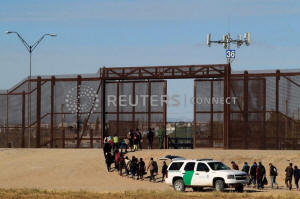|
U.S. asylum seekers returned to Mexico
despite fear claims under policy challenged in court
 Send a link to a friend
Send a link to a friend
 [March 23, 2019]
By Dan Levine and Lizbeth Diaz [March 23, 2019]
By Dan Levine and Lizbeth Diaz
SAN FRANCISCO/TIJUANA (Reuters) - Two
people from Central America seeking asylum in the United States were
sent back across the border to Mexico on Thursday, despite their claims
that a return to Mexico was too dangerous, as part of the first test of
a controversial new Trump administration policy.
The returns came as a U.S. federal judge in San Francisco on Friday
heard legal arguments on whether or not to halt the policy, known as the
Migrant Protection Protocols (MPP), which was rolled out in late
January.
The major policy shift is based on a decades-old law that says migrants
who enter from a contiguous country can be returned there to wait as
their deportation cases move forward. But this provision had never been
used for these types of returns before.
The American Civil Liberties Union and other rights groups have sued,
saying that migrants are being returned to dangerous border towns where
they cannot access legal counsel or get proper notice of their hearings.

Two migrants from Honduras tried to make the case to U.S. asylum
officers that Mexico was too dangerous for their return, according to
their lawyer Robyn Barnard from the nonprofit group Human Rights First.
But on Thursday evening, after being held in custody for two days, they
were sent back across the border.
A third migrant, 35-year-old Douglas Oviedo from Honduras, said he was
interviewed by authorities and returned to Tijuana on Tuesday. They are
among the first to test the process of claiming a fear of returning to
Mexico.
Asylum seekers typically undergo what is known as a "credible fear"
interview to assess their eligibility for a court process. But the
standard of proof for a "reasonable fear" of being returned to Mexico is
much stiffer.
Barnard said one client, 19-year-old Ariel, who asked to be identified
only by his middle name, broke down in tears during the interview with
U.S. officials, which lasted several hours.

Another client, a 29-year-old man who said he was an evangelical leader
who fled Honduras because of threats over his anti-gang activity, was
also sent back, Barnard said.
[to top of second column]
|

Migrants from Central America are seen escorted by U.S. Customs and
Border Protection (CBP) officials after crossing the border from
Mexico to surrender to the officials in El Paso, Texas, U.S., in
this pictured taken from Ciudad Juarez, Mexico December 3, 2018.
REUTERS/Jose Luis Gonzalez/File Photo

More than 200 people have been returned to Mexico so far under the
MPP, which is now in place at the San Ysidro and Calexico ports of
entry in California and the El Paso, Texas, port of entry and to
migrants who ask for asylum between ports of entry in the San Diego
area, according to the U.S. Department of Homeland Security (DHS).
That is a small portion of the tens of thousands of migrants mostly
from Central American who have tried to enter the United States and
claim asylum in recent months.
The U.S. government has said the policy is necessary to stem the
ballooning number of asylum claims, many of which are ultimately
denied, because migrants can end up living in the United States for
years due to huge immigration court backlogs.
DHS did not immediately respond to a request for comment on their
cases. The U.S. Citizenship and Immigration Services, which conducts
asylum interviews said it cannot comment on individual cases because
confidentiality rules apply.
"A lot is still unknown, I haven't been given any written reasons or
determinations for their return," Barnard said.

Lawyers for the rights groups and for the government argued over the
technical aspects of the policy on Friday in front of U.S. District
Judge Richard Seeborg. He asked a series of detailed questions about
whether the Trump administration had discretion to implement the
policy. Seeborg also wondered how broadly of an injunction he could
issue and whether any stop to the policy should apply nationally. He
is expected to rule on the case in a written decision.
(Reporting by Dan Levine in San Francisco and Lizbeth Diaz in
Tijuana; Additional reporting and writing by Mica Rosenberg; Editing
by Leslie Adler)
[© 2019 Thomson Reuters. All rights
reserved.]
Copyright 2019 Reuters. All rights reserved. This material may not be published,
broadcast, rewritten or redistributed.
Thompson Reuters is solely responsible for this content. |